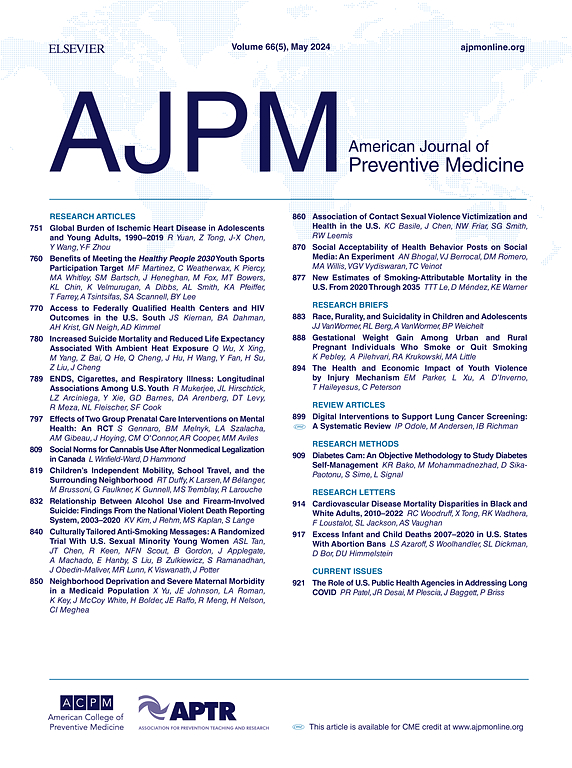Public Support for Warning Label Policies on Social Media Among U.S. Adults in 2024
IF 4.5
2区 医学
Q1 MEDICINE, GENERAL & INTERNAL
引用次数: 0
Abstract
Introduction
Health warning labels are used across several regulatory spaces to warn consumers about potentially harmful products. The study goal was to assess U.S. adults’ public opinions about health warning label policies on social media in general and for commercial tobacco/nicotine products specifically in response to a call from the U.S. Surgeon General on health warning label policies on social media. This study examined support by political party affiliation.
Methods
A nationally representative online survey was conducted in September 2024 among U.S. adults. Respondents indicated how much they strongly agreed (5) or strongly disagreed (1) with 5 statements about social media health warning labels, including mental health, influencer promotions, and tobacco/nicotine products. Log binomial regression models were constructed to estimate relative support prevalence by political affiliation. Analyses were conducted in 2024–2025.
Results
U.S. adults, regardless of political affiliation, generally supported social media health warning label policies, including agreeing/strongly agreeing that social media platforms should be required to have warning labels on posts promoting any tobacco product (81.2% of Democrats, 74.8% of Republicans). Democrats and Republicans were also closely aligned in support of influencer disclosures generally (82.9% and 80.5%, respectively) and in their support that social media platforms should do more to warn youth about the harms of vaping (82.4% and 77.2%, respectively). Democrats generally expressed the highest levels of support, whereas those who identified as independent or with no affiliation generally expressed the lowest levels of support.
Conclusions
Adding sponsored content disclosures and health warning labels to social media platforms and related posts is generally supported by U.S. adults, showing promise for policy adoption and implementation.
2024年美国成年人对社交媒体上警告标签政策的公众支持
简介:健康警告标签(hwl)用于多个监管空间,以警告消费者有关潜在有害产品。该研究的目的是响应美国外科医生关于社交媒体上HWL政策的呼吁,评估美国成年人对社交媒体上HWL政策的公众意见,特别是对商业烟草/尼古丁产品。这项研究考察了政党关系对支持的影响。方法:2024年9月在美国成年人中进行了一项具有全国代表性的N调查。受访者表明了他们在多大程度上强烈同意(5)或强烈不同意(1)关于社交媒体hwl的五个陈述,包括心理健康、网红促销和烟草/尼古丁产品。建立了对数二项回归模型来估计政治派别的相对支持率。分析时间为2024-2025年。结果:无论政治派别如何,美国成年人普遍支持社交媒体HWL政策;包括同意/强烈同意社交媒体平台应该被要求在宣传任何烟草产品的帖子上贴上警告标签(81.2%的民主党人;74.8%的共和党人)。民主党人和共和党人在支持网红信息披露方面也保持密切一致(分别为82.9%和80.5%),社交媒体平台应该做更多的工作来警告年轻人电子烟的危害(分别为82.4%和77.2%)。民主党人普遍表示最高水平的支持,而那些被认为是独立人士或无党派的人普遍表示最低水平的支持。结论:在社交媒体平台和相关帖子中添加赞助内容披露和hwl得到了美国成年人的普遍支持,显示出政策采纳和实施的前景。
本文章由计算机程序翻译,如有差异,请以英文原文为准。
求助全文
约1分钟内获得全文
求助全文
来源期刊

American Journal of Preventive Medicine
医学-公共卫生、环境卫生与职业卫生
CiteScore
8.60
自引率
1.80%
发文量
395
审稿时长
32 days
期刊介绍:
The American Journal of Preventive Medicine is the official journal of the American College of Preventive Medicine and the Association for Prevention Teaching and Research. It publishes articles in the areas of prevention research, teaching, practice and policy. Original research is published on interventions aimed at the prevention of chronic and acute disease and the promotion of individual and community health.
Of particular emphasis are papers that address the primary and secondary prevention of important clinical, behavioral and public health issues such as injury and violence, infectious disease, women''s health, smoking, sedentary behaviors and physical activity, nutrition, diabetes, obesity, and substance use disorders. Papers also address educational initiatives aimed at improving the ability of health professionals to provide effective clinical prevention and public health services. Papers on health services research pertinent to prevention and public health are also published. The journal also publishes official policy statements from the two co-sponsoring organizations, review articles, media reviews, and editorials. Finally, the journal periodically publishes supplements and special theme issues devoted to areas of current interest to the prevention community.
 求助内容:
求助内容: 应助结果提醒方式:
应助结果提醒方式:


